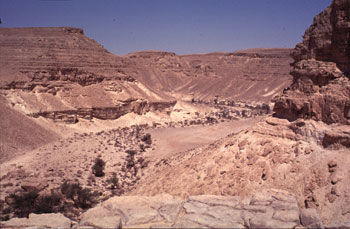Job 13-14
A Bible study with Jeffrey J. Harrison
Last time, we heard Tzophar rebuke Job and accuse him falsely, just as Job’s other friends had done. He did this with religious-sounding statements that in themselves may often be true. But they don’t fit the case of Job at all. As God himself had said, Job was blameless (Job 1:8; 2:3).
It’s easy to understand Tzophar’s point of view. Jesus’ own disciples certainly did. When they encountered a man born blind, they asked: Who sinned, this man or his parents, that he was born blind?
(John 9:2). It’s easy to make a connection between suffering and sin. And sometimes it’s true. But not always.
Why are we so quick to condemn? For one, it’s much easier to assume that there’s sin in someone’s life than to look more deeply. But if we took the time, we would find that we, like Job’s friends, are often sorry comforters to the afflicted. It’s easier to be self-righteous than to reach out and help those in need.
When Job responded to Tzophar, he moaned that his righteousness did him no good—that it had become a joke to people. Often it’s the unrighteous that prosper, while the righteous suffer. God’s ways don’t fit into a neat little box. He overturns the mighty and he exalts the afflicted. He reveals what is hidden and hides other things in darkness. He turns our nice, comfortable way of looking at the world upside-down. Why? Because his ways are not our ways. He’s a much bigger God than we have any idea, and his plans and his purposes are far beyond what we can imagine.
Job Wants to Speak Directly to God
Job 13:1: “‘Look, all of this my eye has seen; my ear has heard and discerned it.’”
Job has already heard and considered all the arguments advanced by his friends.
13:2: ‘“All your# knowledge I, too, have long known. I am not inferior to you#.’”
Job has known all these things for a long time. He himself probably once shared these same opinions.
13:3: ‘“Nevertheless, I would speak to Shaddai, and I desire to reprove God (El).’”
But Job still wants to bring his case directly to God, so he can prove him wrong. Job is not the only one to argue with God in the Bible. Abraham bargained with God (Gen. 18:17-33); Moses got him to change his mind (Exo. 32:14, Num. 14:11-20, Num. 16:20-24). Other prophets, too, brought their case before the Almighty (Jer. 12:1, 15:18; Hab. 1:2-4, 13).
13:4: ‘“But you# who smear with falsehood, worthless healers are you# all.’”
Job’s friends have not only failed to bring him healing, they’ve made it worse by smearing him with false accusations.
13:5: ‘“If only you# would be completely silent; and that would be your# wisdom!’”
If only his friends would be quiet, it would at least give the impression of wisdom, which their speaking so far has not done.
13:6: ‘“Please, listen to my argument and pay attention to the pleadings of my lips.’”
Job desperately wants them to listen to his arguments instead of simply dismissing him.
13:7: ‘“Is it for God (El) you# speak injustice, and for him you# speak deceit?’”
Are you speaking for God when you speak these falsehoods?
13:8: ‘“Will you# lift up his face if you# dispute for God (El)?’”
Will you gain God’s approval if you argue on his behalf?
13:9: ‘“Will it benefit [you] when he examines you# if you# deceive him as [you] deceive a man?’”
Will deceiving God help you when the time comes for him to examine you?
13:10: ‘“If you# lift up a face in secret, he will surely rebuke you#.’”
God will reprove you if you show favor unjustly.
13:11: ‘“Doesn’t his dignity terrify you# and the dread of him fall on you#?’”
Don’t you fear God?
13:12: ‘“Your# remembered sayings are proverbs of ashes; your# defenses as defenses of clay.’”
Your sayings are worthless, as are your defenses against what I say.
13:13: ‘“Keep quiet before me and I will speak; and let come on me what may.’”
Instead of trying to silence him, Job wants his friends to be quiet, and let God respond to his words as he will.
13:14: ‘“Why do I carry my flesh in my teeth, and set my soul in the palm of my hand?’”
Why do I risk my life like this, speaking out this way before God?
13:15: ‘“If he kills me, I will wait for him; surely I will prove my ways to his face.’”
Even if he kills me, I will wait for the chance to prove my case to him. Here’s another allusion to life after death.
13:16: ‘“He is also my salvation (yeshuah); for before his face a godless man will not come.’”
There was a common belief in Bible days that coming before the face of God meant instant death. A godless man would want to avoid this at all costs. But Job is willing to pursue a meeting with God in faith that God will spare him because of his righteousness. Why? Because Job, too, is looking to God for his salvation; he, too, trusts in God. Here Job uses the noun form of Jesus’ Hebrew name (Yeshua), a beautiful hidden prophecy of the Savior.
13:17: ‘“Hear# carefully what I am saying and what I declare in your# ears.’”
Pay close attention to what I am saying.
13:18: ‘“Look, please, I have laid out my case. I know that I am righteous.
13:19: Who is it that will dispute with me? For then I will be silent and die.’”
Job dares anyone to disprove his righteousness. Only then will he be silent and die.
13:20: ‘“Only two things do not do* with me; then from your* face I will not be hidden.’”
The singular forms (marked with an *) tell us that Job is speaking to God again. He asks God for two things so that he will be able to come before him and present his case.
13:21: ‘“Remove the palm of your* hand from me, and let not the dread of you* terrify me.’”
First, Job asks that God would remove the oppression he is experiencing, and second that God would keep him from experiencing a paralyzing dread in his presence.
13:22: ‘“And then call and I will answer; or I can speak and you* will restore me.’”
With those conditions met, he will be ready to meet God. Either God can call on Job first, or Job will speak first, after which he is sure God will restore him.
13:23: ‘“How many are my iniquities and sins? Make known to me my transgression and my sin.’”
What are the sins I am being punished for? I want to know.
13:24: ‘“Why do you* hide your* face? And why do you* consider me your* enemy?’”
Why don’t you reveal yourself to me? Why do you treat me as an enemy?
13:25: ‘“The leaf driven by the wind you* cause to tremble; and dry stubble you* pursue.’”
Job compares himself to an insignificant leaf or dry stubble that God is pursuing.
13:26: ‘“For you* decree bitter things against me and cause me to inherit the iniquities of my youth.’”
For God is bringing difficult things against him, punishing him for sins that are far in the past.
13:27: ‘“And you* place my feet in the stocks and guard all my paths. For the soles of my feet you* have carved a limit.’”
God has locked him up and guards him like a criminal. He has made a limit beyond which Job is not able to go.
13:28: ‘“And he, like something rotten, wears out, like a garment a moth has eaten;’”
Meanwhile, Job says, mankind, referring especially to himself, is wearing out like something rotten, or clothing eaten by moths.
14:1: ‘“Man born of woman is short of days and abounding in trouble.’”
Human beings live short, troubled lives.

14:2: ‘“He went out like a flower and he withered; he fled as a shadow and does not remain.’”
Man blooms and withers like a flower, he disappears like a shadow.
14:3: ‘“Surely you* have opened your* eyes to this; and yet you* bring me into judgment with you*.’”
Surely you know about the frailty of human life, God, yet you bring me into judgment. Why?
14:4: ‘“Who can make something clean from what is unclean? No one.’”
The word for clean
used here (tahor) implies ceremonial or ethical cleanliness. As can be seen in the Law of Moses, contact with unclean things only produces more uncleanness (Haggai 2:13). Unclean things cannot make anything clean.
14:5: ‘“Since his days are cut short, the number of his months is with you*; you* have set his limit and he may not pass over it.’”
God has limited the length of man’s life by setting a limit that he cannot cross over.
14:6: ‘“Turn your* gaze away from him so he can rest, so that he may be pleased with his day like a hired man.’”
Job asks God to turn away the pressure of his scrutiny, so that man (and especially Job) can have a little rest. He wants to enjoy his life like a simple, hardworking man.
14:7: ‘“For there is hope for a tree if it is cut down, that it will yet sprout anew and its shoot will not cease.’”
If a tree is cut down, there is always the hope that it will spring back to life again.
14:8: ‘“Though its root grows old in the earth and its trunk dies in the dry earth,’”
This can happen even if its roots are old and the trunk appears dead.
14:9: ‘“With the scent of water it will sprout and produce branches like a young plant.’”
When a little water appears, the tree will put out shoots and branches like a much younger plant.
14:10: ‘“But when a fellow dies and is laid prostrate; when a man expires, then where is he?’”
But when a man dies and is laid to his rest, when he perishes, what happens to him?

14:11: ‘“As waters have disappeared from the sea and a river becomes parched and dries up,’”
In the desert climate of the Middle East, water evaporates very quickly. Inches of water can disappear from a lake in a single day. Dry river beds are a common sight. And when this water disappears, it doesn’t come back again—it’s gone.
14:12: ‘“So a man who has laid down will not rise until the heavens are no more. They will not awaken and will not be roused from their sleep.’”
Like evaporated water, once man dies he does not come back—at least not until the heavens themselves are removed. This is a prophetic allusion to the time of the resurrection (Isa. 34:4; Matt. 5:18; Rev. 6:14, 20:11).
14:13: ‘“If only in Sheol you* would hide me, you* would conceal me until your* anger has passed; if only you* would set for me a limit and then you* would remember me.’”
If only God would hide him in the place of death until his anger had passed. Job wants God to set a limit to his sufferings, and then remember him and deliver him.
14:14: ‘“If a fellow dies, will he live? All the days of my warfare I will wait until the coming of my relief.’”
Here Job raises the question of life after death. He compares the struggles of his life to a hard-fought war, in which he is waiting to be relieved of his duty.
14:15: ‘“You* will call and I will answer you*; you* will long for the work of your* hands.’”
One day, he hopes, God will yearn for him and call for him.
14:16: ‘“For then you* will number my steps; you* will not keep watch over my sin.’”
Then God will be attentive to the short length of his life, and no longer keep track of his sins.
14:17: ‘“My transgression will be sealed in a bag; and you* will plaster over my iniquity.’”
All his sins will be hidden from sight and from memory.

14:18: ‘“And yet a falling mountain sags down, and a rocky cliff is removed from its place.’”
But back in Job’s reality, the irreversible process of erosion continues. Landslides are common in the desert cliffs of the Middle East. Because of the lack of vegetation, these scars can be seen for hundreds of years.
14:19: ‘“Water erodes stones, its outpourings wash away the dust of the earth; so the hope of man you* have destroyed.’”
Water overcomes even rock over time. In the same way, Job says, God washes away the hope of man, and of this man in particular.
14:20: ‘“You* overpower him forever and he departs, changing his face [in death], and you* send him away.’”
God wins the battle and men die, their faces changing in death, and God sends them away.
14:21: ‘“His sons will be honored and he will not know it; and they will become insignificant and he will not perceive it.’”
After death, man is no longer aware of what happens on earth. His children could become famous or achieve nothing, and he would never know it.
14:22: ‘“Surely his flesh upon him is in pain and his soul mourns over him.’”
Here Job speaks again of life, and especially of his own life, as one of pain and mourning.

